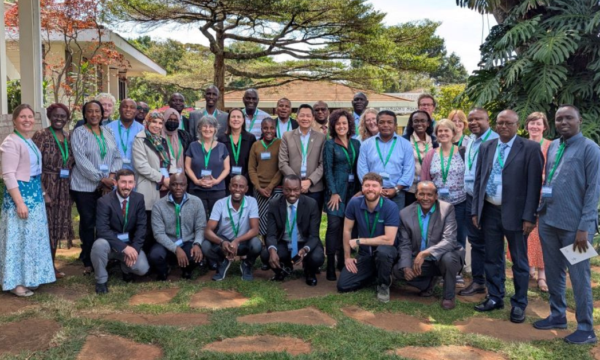
CABI has worked in partnership to help develop a simplified manual outlining with illustrations the details of the KS 1758: Horticulture Code of Practice for Kenya which is aimed at enabling more farmers to produce safe food.
KS 1758 specifies the rules for safe and sustainable production of horticultural produce in Kenya, both for domestic and export markets. It provides for uniformity in certain practices and aids in establishment of best practice by all actors in the sector.
The production of the manual follows CABI’s delivery, by scientists from its regional centre for Africa, based in Nairobi, of ‘Trainer of Trainers’ training in May 2023 to increase the pool of trainers who in turn deliver training to producers.
Used for awareness creation
The work has been carried out as part of the CABI-led global PlantwisePlus programme. As part of the co-creation process CABI, SIC and Executive Committee members met in December 2023, to review, validate and sign off the KS1758: Horticulture Code of Practice Illustration Manual. This exercise was led by the Chairman of the KS 1758: Horticulture code of practice Executive committee and CEO Fresh Produce Exporters Association of Kenya (FPEAK) Mr Hosea Machuki.
This exercise was led by the Chairman of the KS 1758: Horticulture code of practice Executive committee and CEO of the Fresh Produce Exporters Association of Kenya (FPEAK) Mr Hosea Machuki.
It will be used for awareness creation, farmer advisory among farmers and agro-dealers and other relevant stakeholders in the horticulture sector. This followed a series of workshops held by members of the KS 1758 Standard Implementation Committee, the KS 1758 executive committee and CABI.

Adhering to Good Agricultural Practices
Dr Naphis Bitange, Postdoctoral Fellow-Systems Agronomist at CABI, said, “The code has been simplified into an easily understood formant for users. It is less wordy and puts into perspective the dos and don’ts and the benefits of various farmer practices.”
While receiving finalised copies of the manual on behalf of partners Ag. Deputy Director, Regulations and Compliance department in the Horticultural Crops Directorate of the Agriculture and Food Authority Director Mr. Collins Otieno, thanked CABI for the collaboration in the development of the manual and other initiatives that have shaped the KS 1758 code journey. He noted that they look forward to such collaborations in the future.
CABI’s Sanitary and Phytosanitary (SPS) Global Lead Dr Benoit Gnonlonfin noted that the manual will go a long way in assisting actors adhering to Good Agricultural Practices, regional and international Sanitary and Phytosanitary (SPS) requirements.
Other work that has been carried out under the PlantwisePlus programme, is the training of more trainers and the development of Pest Management Decision Guides on select value chains.
The KS 1758: Horticulture Code of Practice was introduced in 2016 and is anchored on four pillars: Food Safety, Environmental Sustainability, Worker Health and Safety and Plant Health.
The code provides guidelines on among others control of pests, procurement, transportation and storage of plant protection and observance of pre-harvest interval.
Additional information
Compliance to KS 1758 webinar series
CABI facilitated a webinar “Compliance to KS 1758 made easy: Enhancing agricultural practices among Kenyan farmers.” You can watch the webinar again here. On request, enter the passcode: ZG=wf#12
Relevant stories
‘PlantwisePlus training helps Kenya meet KS1758 food safety standard.’
‘More trainers of KS1758 – Horticultural Code of Practice to reach more farmers in Kenya.’
About PlantwisePlus
PlantwisePlus is a global programme, led by CABI, to increase incomes and grow safer and higher quality food through sustainable approaches to crop production.
Working in close partnership with relevant actors, PlantwisePlus strengthens national plant health systems from within, enabling countries to provide farmers with the knowledge they need to lose less and produce more.
CABI gratefully acknowledges the financial support of the Directorate General for International Cooperation (DGIS, Netherlands), the UK Foreign, Commonwealth & Development Office (FCDO), the Swiss Agency for Development and Cooperation (SDC), for the PlantwisePlus programme.
For more information visit: https://www.plantwise.org
Facebook: https://www.facebook.com/Plantwise
Twitter: https://twitter.com/CABI_Plantwise (@CABI_Plantwise)
Related News & Blogs
Training delivered on early warning system using Earth Observation data to help manage crop pest pests in Kenya
CABI has teamed up with the Kenya Agricultural & Livestock Organization (KALRO) to deliver training aimed at helping smallholder maize, bean and tomato farmers understand important crop pest alerts derived from Earth Observation data. Experts in di…
30 April 2025




